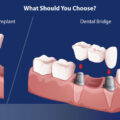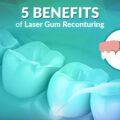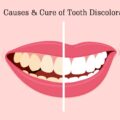
oral health
edental
2 August 2019
Benefits of Fluoride- How Fluoride Helps Our Teeth?
Fluoride is found naturally in soil, water, and foods. It is also produced synthetically for use in drinking water, toothpaste, mouthwashes and various chemical products. It is also known as “nature’s cavity fighter,” is a mineral compound derived from an abundant chemical element called fluorine, the 13th most abundant element in the earth’s crust. It is found in rocks, water and soil, as well as food and beverages in varying amounts. 95% of the fluoride we add to our water supply comes from phosphorite rock.
Fluoride helps teeth in two ways. When children eat or drink fluoride in small doses, it enters the bloodstream and becomes part of their developing permanent teeth. Swallowed fluorides also become part of the saliva and strengthen teeth from the outside. Acids are less able to damage tooth enamel strengthened by fluoride. It helps prevent tooth decay by slowing the breakdown of enamel and increasing the rate of the remineralization process. The new enamel crystals that form are harder, larger and more resistant to acid. Tooth enamel is porous in nature which most of us do not know. Plaque on the surface of your teeth can produce acids that seep into the pores of the enamel and break down its internal structure. This process, called demineralization, can create a weak spot in the tooth that may become a rod like cavity if left untreated.
Before teeth break through the gums, the fluoride taken in from foods, beverages and dietary supplements makes tooth enamel stronger, making it easier to resist tooth decay. After teeth erupt, fluoride helps remineralize weakened tooth enamel and reverses early signs of tooth decay. The fluoride you take in from foods and beverages continues to provide a topical benefit because it becomes part of your saliva, constantly bathing the teeth with tiny amounts of fluoride that help rebuild weakened tooth enamel.
How Do I Get Floride?
● Toothpastes containing fluoride help prevent cavities in both children and adults. To strengthen weak spots and exposed roots, and to help prevent the early stages of tooth decay, brush regularly with a fluoridated toothpaste.
● Rinsing your mouth with mouthwash that contains fluoride is another way to help protect you and your family from cavities.
● Adding fluoride to your drinking water is one of the easiest and most cost-effective methods of protecting children and adults from tooth decay. If you are not aware of this practice then consult your dentist and they will advise you on proper dosage.
What are the risks? Exposure to high concentrations of fluoride during childhood, when teeth are developing, can result in mild dental fluorosis. There will be tiny white streaks or specks in the enamel of the tooth. This does not affect the health of the teeth, but the discoloration may be noticeable. Breastfeeding infants or making up formula milk with fluoride-free water can help protect small children from fluorosis. Children below the age of 6 years should not use a mouthwash that contains fluoride. Children should be supervised when brushing their teeth to ensure they do not swallow toothpaste.
Excess exposure to fluoride can lead to a bone disease known as skeletal fluorosis. Over many years, this can result in pain and damage to bones and joints. The bones may become hardened and less elastic, increasing the risk of fractures. If the bones thicken and bone tissue accumulates, this can contribute to impaired joint mobility.
Dentists limit the amount of tablets they prescribe at one time to reduce the risk of overdose. To avoid any chance of overdose, do not stock up on fluoride tablets in your home. If you have any questions regarding fluoride risks, talk to your dentist or physician. Fluoride plays a key role in the health of your teeth, and now that you know of its importance, you can practice it with more regularity to your oral care habits.




